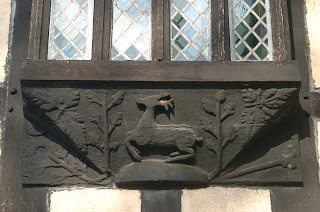shakespeare agecroft1

Tuesday, November 6, 2012
Horse, hound, and hind
"Under this thick-grown brake we'll shroud ourselves;
For through this land anon the deer will come;
And in this covert will we make our stand,
Culling the principal of all the deer."
Henry VI, Part III (III, i)
Two gamekeepers, crossbows in hand, make these plans in one of Shakespeare's earliest plays. Little do they know that into their midst will shortly wander a royal quarry indeed: a dethroned Henry VI, pious but weak, incompetent, pitiful. Henry has stumbled over the border from exile in Scotland, longing to see his own country again. The keepers, undoubtedly surprised by this turn of events, take Henry into custody, regarding him as no longer their king.
He would later be murdered in the Tower of London at the hands of RP3 (whether that was a hip nickname for Richard Plantagenet III is merely wishful thinking). Anyway, at the time of the murder, Richard was still titled Duke of Gloucester. He'd weasel his way to the throne in a while.
Pictured above is a 17th-century decorative carving of a male deer beneath one of the east-facing upstairs windows of Agecroft Hall. It has long since been coated with a tar-like, carbon-based substance for its preservation. The imagery is not the least bit out of the ordinary in a time when hunting with horse, hound, and hawk was usually the favorite sport of English kings and nobility alike. They were well aware, even then, that the country's resources were not infinite and they made incredibly harsh laws preventing commoners from lawfully pursuing all but the most worthless types of game, even in times of dearth. A poacher caught on royal or manorial lands was lucky to avoid being hanged.
The nobility loved their sport, they enjoyed venison on their dining tables, and they were greedy. Whether the low-born went hungry was not their problem, or so they thought. The mid-to-late 1590's, by which time Shakespeare had already written his Henry VI plays, saw several consecutive years of bad weather and crop failures, making the hungry lower social classes all the more desperate, all the more willing to risk the noose for a deer stolen in the night.
Subscribe to:
Post Comments (Atom)

No comments:
Post a Comment